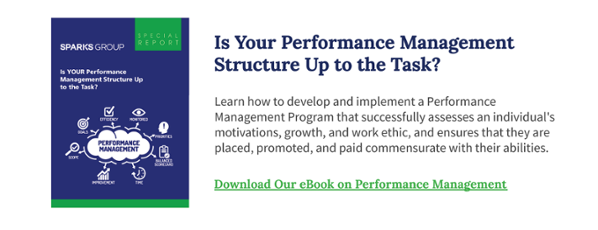
Once conducted annually, employee performance reviews are now recommended to be quarterly meetings. Organizations may handle these reviews differently based on the size of the organization, but the universal principle and format on how you talk with an employee about their performance is mostly the same.
Lead your meeting confidently by following these best practices when preparing and conducting performance reviews. Employees will appreciate your honest and positive feedback and motivational career guidance.
How Managers Can Prepare for an Employee Performance Review
1. Set Goals in the Employee Handbook
From day one, it is imperative that employees know exactly what is expected of them in all aspects of the job. This includes professional goals that are clearly defined, the metrics for the performance review program, employee behavior, attendance, company culture guidelines and communication expectations. Written agreements are best and set the stage for success.
Based on your organization and the employee, assess their professional goals on either a weekly, bi-weekly or monthly basis. This is important to have when it’s time for the performance appraisal, instead of pulling from recent information days before the review, which tends to lead to an ineffective poor review meeting. Aim to set developmental goals using these three best tactics:
- Clearly state how you will evaluate the employee’s performance. Will this be done at the end of each week in an emailed report that is then discussed monthly and quarterly?
- Goals should be kept to around five or six achievements, and relate to both professional development and specific job performance goals. This demonstrates your investment in the employee and builds their trust, leaving you with a motivated, committed, well-educated, and successful employee.
- Disclose with the employee on how their personal success is a building block that fits into long-term company goals. Employees want to feel their contributions are making a difference toward the larger picture.
2. Record and Analyze Employee Performance Evaluations
As we discussed earlier, employees should hear positive reinforcement and feedback on performance that needs improvement on a daily or weekly basis. Ongoing feedback and tracking allows for you to record and analyze data for the actual review meeting when you can re-emphasize those critical points. Additionally, employees are more motivated for success when praise is given immediately instead of providing delayed recognition on a project completed seamlessly months ago. Keep this information in a file for organized easy access, and be ready to pull the employees’ personal file.
3. Solicit 360-Degree Feedback
This information from the employee’s direct boss, their circle of coworkers and any reporting staff will provide a birds-eye view to their entire scope of work and how they are interacting within the company.
4. Share the Performance Review Form in Advance with the Employee
When employees digest the evaluation beforehand, initial reactions are private whether they are positive or negative. This also allows the employee time to professionally prepare for the conversation and make the most out of valuable meeting time.
How to Conduct the Employee Performance Review
Communicate with the employee through two-way conversation during this meeting. Nobody wants to be lectured or spoken to in a negative manner. When you approach the review with a genuine attitude, the conversation is positive, and employees are more receptive to feedback, whether it is positive or reconstructive. Encourage the employee to talk throughout the entire performance review meeting. Questions to ask could include:
- What goal do you predict being the biggest challenge this quarter?
- Outline the support you need to tackle this challenge and to succeed.
- What are your goals for the company this year?
- How can I be a better manager to help you grow?
- Do you have any suggestions on how to grow in your position?
- What schedule works best in providing daily or weekly performance reports?
The goal of performance reviews is to evaluate job performance and reinstate your commitment to the employee. Be sure to disassociate pay with this review and let employees know that raises are based on a wide range of factors and given on an annual basis. Following these best practices will strengthen your annual performance review program and further the productivity level of employees who will stay motivated and excited about their position.
Contact Sparks Group to discuss your hiring and talent management needs.







